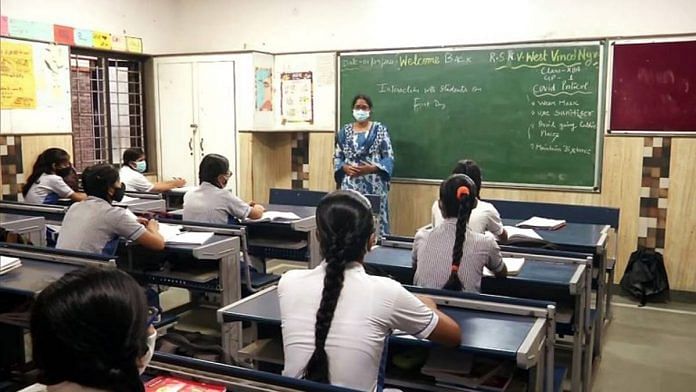New Delhi: In a guideline issued to schools across India earlier this month, the Ministry of Education (MoE) has instructed institutions to take responsibility for textbooks introduced by them in the curriculum, and that are not suggested either by any central or state boards or agencies.
The instruction comes in the wake of multiple recent incidents of schools coming under fire for controversial teaching material.
The MoE in early October launched the “Guidelines on School Safety and Security”, which addresses various aspects of safety on school premises and gives instructions with respect to children’s well being in school. One of the points in the guidelines refers to the curriculum. The guidelines apply to both government and private schools.
According to the guidelines, in case schools are not following textbooks prescribed by the National Council for Educational Research and Training (NCERT), State Council for Educational Research and Training (SCERT) and respective state boards, “the school shall put up a list of books prescribed/selected by it on its website and notice board”.
“It will also put up a written declaration on its website, jointly signed by the Manager and the Principal in private schools, and by the Principal or Head of school in government schools, to the effect that the school owns the responsibility of having thoroughly checked and having gone through the contents of the books prescribed by the school,” the guidelines add.
Also read: How I got into trouble in Kerala for setting a question paper with the word ‘Muhammed’ in it
‘Not possible for NCERT, SCERTs to take blame’
Speaking about the guidelines, an NCERT official told ThePrint, “There have been many incidents in the past when schools have been found to be teaching controversial textbooks and oftentimes, those are textbooks that have not been prescribed by us. It is not possible for the government, NCERT or SCERTs to take the blame for things that they have not prescribed for them.”
“Hence, it is important that schools take the responsibility for textbooks they are introducing on their own, of course keeping in mind the other specifications in the school safety guidelines,” he added.
The guidelines also clarify that books chosen by the schools should not “promote any kind of discrimination based on caste, class, religion, gender, ethnicity, language, etc”.
Further, “it should promote sensitivity towards environmental protection, gender parity, inclusion, ethical behaviour, etc and should promote healthy habits of eating, cleanliness and sanitation, reading, working together, helping each other, collaboration in place of competition, etc”.
The guidelines also mention that the “routine of the school must include enough space for dialogue, reflection and discussion on school safety, on-road safety, healthy and nutritious food, adolescence issues”.
It says that there should be discussions on related topics during the morning assembly, mid-day mealtime, on sports grounds, during the classes. “Space should also be created in the school schedule for the training and drills to address disaster management,” it adds.
Also read: NEET isn’t about merit at all. It’s about elimination of students
Flak for controversial teaching material
School textbooks, both prescribed by the NCERT and those that are not, have courted controversy from time to time because of certain contents included in them.
In a recent incident, there was outrage over ‘Islamophobic content‘ in Class 8 social science textbook in Telangana. The textbook had a chapter showing a picture of a terrorist holding a gun in one hand and a Quran in the other. After it was highlighted, the Telangana school department said they will take appropriate action against the publisher.
Before this, in May, a poem in an NCERT Hindi textbook drew flak on social media for “promoting child labour”. The poem ‘Aam ki tokri‘ had an image of a young girl carrying mangoes on her head, in a way that street vendors and sellers do.
The Central Board of Secondary Education (CBSE) had also, in 2018, introduced a new clause in its by-laws stating that schools could lose affiliation if they introduce books with “objectionable content”.
(Edited by Poulomi Banerjee)
Also read: I taught Mahasweta Devi’s Draupadi in DU. Discomfort was at the core of the classroom



